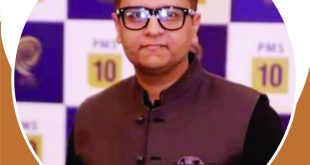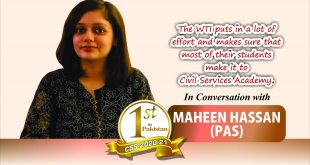JWT is the only magazine that fully caters for the needs of CSS aspirants. It sums up vast knowledge in one volume.
JWT: First of all, please tell us about your educational background?
AVAIS SHAFIQ (AS): I got my early education from Army Public School Chunian, District Kasur. Afterwards, for intermediate, I was lucky enough to get admission to Army Burn Hall College Abbottabad that is, undoubtedly, one of the most prestigious institutions in Pakistan. Later, I went to UVAS Lahore and did my graduation in veterinary sciences with a CGPA of 3.82, and also won the silver medal.
Since the very start of my education, I think most distinctive qualities of mine have been self-discipline and time management. I have always been very good at understanding what to do and when to do it.
JWT: Was becoming a CSP always your dream? And, was it so important to you that you decided to leave your profession to join the Police Service of Pakistan?
AS: No, becoming a CSP was never my first choice because I have always dreamed of being a part of Pak Army; and my education in military-run institutions speaks volume about my aspirations. But, due to a tragedy back home, unfortunately, I couldn’t join Pak Army though I had passed the initial tests. However, with Allah’s blessings, I have been allocated to the Police Services of Pakistan and thus my dream to serve my country in uniform has come true.
And, as regards the question that why I decided to leave my profession, I would say that I did so because I started preparing for CSS with an aim to be at a position where I could play an active role in changing the lives of my compatriots. Civil Service of Pakistan is the platform that provides me with ample opportunities to effect that change.
JWT: You are surely a source of inspiration for many who want to go for CSS. What would you advise them in this regard? And, how, in your opinion, Jahangir’s World Times (JWT) can serve as a source of guidance for them?
AS: I would advise the prospective CSS aspirants to go for CSS but with full devotion, and with a “Yes, I can” belief. The only tricks to ace this exam are hard work, perseverance and, obviously, your luck.
Regarding JWT, I would say that it is the only magazine that fully caters for the needs of CSS aspirants. It sums up the vast knowledge in one volume. Moreover, the interviews with new CSPs are a real source of inspiration for the aspirants. JWT’s administration is doing a commendable service to CSS aspirants.
JWT: To whom goes the credit of your success?
AS: After Allah’s blessings, I believe that the credit of my success goes to my parents, especially my father. He was the one who made me believe in myself, supported me at every juncture and motivated me to set high goals for me.
 JWT: What is the key to making a difference in the written part of CSS exam?
JWT: What is the key to making a difference in the written part of CSS exam?
AS: Making a difference in written exam requires ‘to the point’ approach and excellent writing skills. Never ever write anything that is irrelevant to the given topic only to increase the length of your answer because it often proves counterproductive. Moreover, impressive presentation of your answer by embellishing it with headings, quotation, maps and flowcharts will surely get you excellent marks. Make things easy for the examiner. Your paper should attract and compel the examiner to read your answers.
JWT: Pakistan Affairs is considered a low-scoring subject. What was your strategy in this subject that you secured excellent marks in it?
AS: Yes, it’s true that Pakistan Affair is considered a low-scoring subject, yet I managed to score 64 marks in it because I had read a number of books on history of Pakistan that increased my knowledge base. You know, every CSS aspirant gathers information from almost same sources, however, it’s the uniqueness that holds the key to excellent score.
JWT: How one can adopt a balanced approach as far as focus on compulsory and optional subjects is concerned?
AS: I believe the selection of subjects is the most important part of CSS. Thoughtful and right subject selection will help an aspirant in attaining higher marks. Both compulsory and optional subjects must be given proper time. Making notes of all subjects will also help aspirants in revision near the exams.
JWT: How do you see the revision of the syllabus for CSS exam announced by FPSC recently?
AS: The revised scheme of things may look difficult to the aspirants but I believe that revised scheme has added diversity to the subjects that will augment the knowledge base of the aspirants. Furthermore, the new entrants like Governance & Public Policies, Town Planning & Urban Management, Gender Studies, and Criminology will practically help officers in discharge of their duties.
JWT: Keeping in view the revision of syllabus, do you think that joining an academy for CSS preparation has become inevitable now?
AS: A huge majority of CSS aspirants, like me, hail from non-CSS background and they don’t have the requisite guidance for this prestigious exam. So, I think, it is better to join an academy as it can help you in strengthening your basics and inputting you on the path to success. Moreover, one can enhance one’s writing skills by appearing in assessment tests conducted by some academies.
JWT: How had been your experience of interview with the panel?
 AS: Actually, it was my first interview at such a high level and, naturally, I was a bit nervous while entering the interview room. When the interview started, the chairman asked me questions about my life at Army Burn Hall College, and also about President Obama’s visit to India as well as its possible impacts on the region. Frankly, it proved to be a very light discussion with the chairman.
AS: Actually, it was my first interview at such a high level and, naturally, I was a bit nervous while entering the interview room. When the interview started, the chairman asked me questions about my life at Army Burn Hall College, and also about President Obama’s visit to India as well as its possible impacts on the region. Frankly, it proved to be a very light discussion with the chairman.
Rest of the panellists asked questions from my optional subjects like International Law, History of USA, Geography and Forestry. I was satisfied with my interview with the rest of the panel too. Topics like Pakistan’s political landscape and the political parties of the country dominated the discussion as a whole. I felt that the panellists did not appreciate my viewpoint that all political parties have flaws; even one worthy panellist asked me, ‘Are all of us bad’?
I believe this point of discussion is the reason why my score in viva voce is lower than my expectations.
 Jahangir's World Times First Comprehensive Magazine for students/teachers of competitive exams and general readers as well.
Jahangir's World Times First Comprehensive Magazine for students/teachers of competitive exams and general readers as well.



